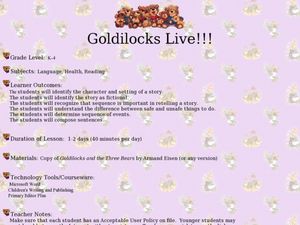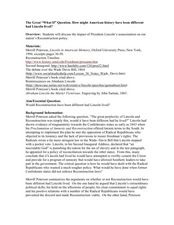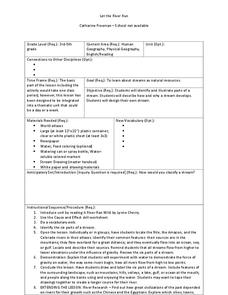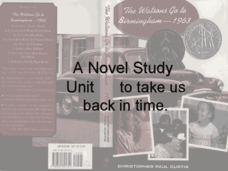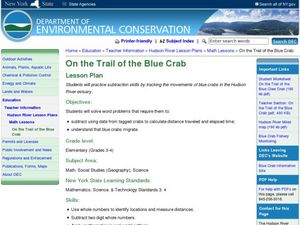Curated OER
The Role of the Opera Orchestra
Students listen to and examine a recording of the opera Don Pasquale and study the various musical instruments in an orchestra. They discuss the difference between a symphony orchestra and an opera orchestra. Finally they play the music...
Curated OER
Word Choice in Writing
Sixth graders discover word choices to use when writing a conversation. They explore synonyms for "said." Students examine a thesaurus. They create a writing piece using the writing process. Students edit and revise their work.
Curated OER
Goldilocks Live!!!
Study story elements with your young learners. Read Goldilocks and the Three Bears and discuss the order of events by making a story panel out of butcher paper. Sentences are given as suggestions for the panel, though you may compose...
Curated OER
EPub--Stuart Little
Following a detailed activity and reading guide students will better grasp their reading of the book Stuart Little. They visit a series of web sites to gain a mouse's perspective then create a Mouse Movie with an iPod camera and Keynote....
Curated OER
Please No Posers
How do you reference information correctly? Avoid plagiarism by accurately summarizing a New York Times article with your middle or high schoolers. Young researchers then insert properly attributed quotations and paraphrases into their...
Curated OER
Importance of American Flag in American Literature
Betsy Ross - fact and myth. As an introduction to American Literature, class members become detectives and search web sites to find information about the flag, prominent places it has been displayed (on the moon, at ground zero, in...
Curated OER
Hooks
Students examine how a hook grabs the readers attention. They read an example of a hook from the book "Charlotte's Web," and discuss the process of writing a hook. Students listen to the story "Hey Al," identify the hooks in the story,...
Curated OER
Creating Energy From Water
Students study water and its energy. In this water energy lesson, students discuss hydroelectricity and make models of water turbines.
Curated OER
Medieval Art
Sixth graders study Gothic architecture on the Internet and create a mug with a gargoyle figure on it.
Curated OER
Compass Rose for the New Millennium
Sixth graders are introduced to the concepts of a compass rose and how it used in relationship to reading maps in geography. The lesson is meant to build upon prior knowledge and skills.
Curated OER
Concerns of Elder Adults
Young scholars collect current events that are important at the local and state level that relate to older adults. They question older persons in regard to issues that are important to them. They listen to a guest speaker discuss current...
Curated OER
Bio-What
Learners explore the concept of biodiversity. Through activities, they discover the importance of one species upon another. Students examine food webs, discuss animals interdependence upon one another, and brainstorm why biodiversity is...
Curated OER
Improving Editing and Proofreading Skills
Young scholars explore interactive web sites to improve their editing and proofreading skills. Using the SMART Board, students identify capitalization and punctuation errors in a given sentence. Young scholars discuss proofreading...
Curated OER
What Lives in Water?
In this early childhood science worksheet set, students study the importance of water, and determine the difference between themselves and water dwellers. They look at adaptations, river life, rainforest life, food chains, pollution, and...
Curated OER
Talking Trash
Define vocabulary related to global waste. Creative thinkers review and illustrate terms for the Global Garbage Picture Dictionary. They play a vocabulary game in which co-operative skills among players in encouraged. A great way to...
Curated OER
Where Life Is Too Short
Students predict how a pandemic would affect aspects of South Africa's society. In this world issues and geography lesson plan, students read a letter outlining the problems affecting South Africa. Students discuss and analyze how...
Curated OER
Puerto Rico: The 51st State?
Young scholars explore Puerto Rico. In this Puerto Rico current events lesson plan, students conduct a Webquest to answer questions about Puerto Rico's culture. Young scholars discuss whether Puerto Rico is a country or a state, and...
Curated OER
The Great "What If" Question. How might American history have been different had Lincoln lived?
Eleventh graders study the Presidency of Abraham Lincoln. In this American History lesson, 11th graders analyze documents related to Reconstruction. Students participate in a debate on Reconstruction.
Curated OER
Let the River Run
Students explore the environment by reading a story in class. In this water formation lesson, students define environmental terms such as rivers, streams, gulf, oceans and lakes. Students read the story A River Ran Wild and discuss the...
Alabama Learning Exchange
A Novel Study Unit to Take Us Back in Time
A Novel Study is the focus of this Literature PowerPoint. A class is about to have author Chris Paul come speak to their class about his novel, The Watson's Go to Birmingham - 1963. Before his appearance, the class is directed to do an...
Curated OER
On the Trail of the Blue Crab
Third graders read the article "Blue Claw," discuss crab migration, and look at a map of the Hudson River. They complete a worksheet where they must use subtraction to determine the distance migrating crabs travel.Web links, article, and...
Curated OER
Add and Subtract with Hudson River shipping
Rivers aren't just a place for animals to live, they also provide industrial transportation. The class will examine the Hudson River on a map, discuss all the commercial vessels that use the River to transport materials, then complete a...
Curated OER
The Hudson's Ups and Downs
Even rivers have tides. Older elementary schoolers will discuss the Hudson River and how weather, water craft, and the ocean cause tidal fluctuation. They will examine a series of line graphs that depict tidal fluctuation, then analyze...
Curated OER
Mammal Mobile
Short but sweet. Younger learners will view images and hear about the characteristics that make-up mammals, they will then discuss why a particular animal is, or is not, a mammal providing specific details. They will then create a mammal...




